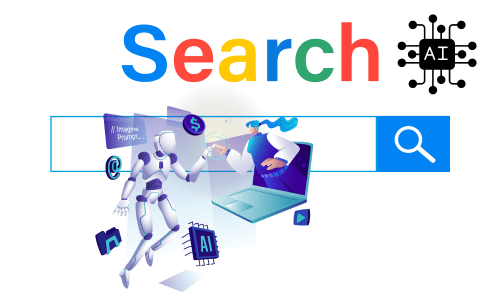For 25 years, Google has been synonymous with digital search. Most of us can’t even remember a time when we didn’t “Google” our questions. Over these years, Google has not only adapted to the ever-evolving digital landscape but has been the pioneer of many innovations that have redefined how we access and consume information online. The latest in its line of groundbreaking updates is the incorporation of generative AI into its search functionalities. So, what exactly is Google’s new Generative AI in Search, and how does it aim to revolutionize our online experiences?
A Journey from Keyword Matching to Contextual Understanding
To appreciate the advancements Google is introducing, it’s essential to remember where it all began. Traditional search algorithms relied heavily on keyword matching. You entered a query, and Google fetched pages where those exact keywords appeared. This method, though revolutionary at the time, lacked nuance and often missed the user’s actual intent.
Enter BERT, Google’s neural network-based technique introduced in 2019, which enabled Google to understand the context of a search query better. This was a paradigm shift, but the tech giant didn’t stop there.
Generative AI: The Next Frontier
The very essence of generative AI lies in its ability to generate content. It doesn’t just understand or recognize patterns, but it can create new, relevant outputs based on its learning. This is a game-changer for search.
Imagine trying to decide on a holiday destination suitable for both toddlers and pets. Traditionally, you’d break down your query into multiple smaller questions, sift through various sources, and then aggregate this data to make an informed decision. With generative AI, Google promises to do most of this heavy lifting for you. By inputting a complex question, you’d receive a snapshot of pertinent information, complete with links to delve deeper. This functionality is designed to help users understand topics faster, unveil unique insights, and navigate tasks with unparalleled ease.
Reimagining Online Shopping
Online shopping, with its convenience and variety, has transformed how we purchase. Yet, it can sometimes be overwhelming due to the sheer volume of options and information. Here again, generative AI promises to be a game-changer.
When you search for a product, Google’s generative AI will offer a comprehensive snapshot: key factors to consider, products fitting your criteria, and product descriptions encompassing reviews, ratings, and prices. The backbone of this enhanced shopping experience is Google’s Shopping Graph—a dynamic database with more than 35 billion product listings. It’s updated hourly, ensuring that search results are fresh and reliable.
The Importance of Diverse Perspectives
While AI-driven search enhancements are exciting, they run the risk of creating echo chambers, where users are continually fed information aligning with their existing beliefs. Google seems acutely aware of this pitfall.
The new search experience is designed to showcase a broad range of voices and sources. Generative AI, rather than replacing the vast content ecosystem, aims to better highlight and direct users to it. Google continues to prioritize driving valuable traffic to websites across the digital realm.
A Balancing Act: Innovating Responsibly
Incorporating AI, especially something as potent as generative AI, is not without its challenges. There are inherent limitations with AI models, and Google candidly admits that the search might not always hit the mark.
To counterbalance the potential pitfalls, Google is adopting a phased, measured approach to rolling out these new capabilities. Additional guardrails have been implemented, and certain types of queries will be limited. To foster transparency and allow users to gauge the AI’s decision-making process, response corroboration features have been added.
Early Adopters and the Road Ahead
For those eager to experience this groundbreaking shift, Google is launching an experiment under Search Labs, termed the Search Generative Experience (SGE). Initially available in the U.S. for English queries, it represents Google’s commitment to refining the user experience continuously.
In Conclusion
As we stand on the cusp of yet another monumental shift in digital search, one thing is clear: Google’s dedication to enhancing user experience is unwavering. The integration of generative AI is not just a technological advancement; it’s a leap towards making information more accessible, relevant, and user-friendly. The future of search is not just about answers, but about understanding, context, and facilitating deeper human-AI interactions.

